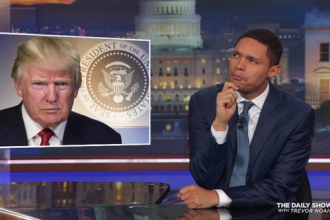South Africa’s trade relations with the United States could face severe challenges after former US President Donald Trump confirmed that his upcoming tariffs will apply to “all countries” and not just those with significant trade imbalances. The announcement, made aboard Air Force One, has sent ripples through global markets, with South African businesses bracing for potential economic strain.
Trump’s ‘Liberation Day’ Tariffs: What’s at Stake?
Trump has set April 2 as what he calls “Liberation Day,” when his administration will unveil a range of reciprocal tariffs aimed at countering what it deems to be unfair trade practices. Many had speculated that the tariffs would primarily target the 15 countries with the highest trade imbalances with the US, a group Treasury Secretary Scott Bessent previously referred to as the “Dirty 15.” However, Trump’s recent comments indicate that no country will be exempt from these measures.
“You’d start with all countries, so let’s see what happens,” Trump told reporters. This broad application contradicts earlier expectations that only the most significant trade offenders would be affected.
South Africa’s Economic Concerns
For South Africa, which exports a range of goods to the US, including minerals, automobiles, and agricultural products, the new tariffs could have dire consequences. The US is one of South Africa’s largest trading partners, and additional levies on key exports could disrupt industries, weaken the rand, and slow down economic growth.
South African trade experts are particularly worried about the impact on the automotive sector. Tariffs on imported vehicles are set to take effect on April 3, a move that Trump’s trade adviser Peter Navarro claims could generate approximately R1.9 trillion ($100
R1,855.66 billion) annually for the US government. With South Africa’s significant automotive exports to the US, local manufacturers may face shrinking demand and higher costs.
Trump’s Justification: ‘Generous’ Yet ‘Substantial’ Tariffs
Despite the sweeping scope of the tariffs, Trump maintains that they will be more “generous” than the measures previously imposed on the US by its trading partners. “They ripped us off like no country has ever been ripped off in history, and we’re going to be much nicer than they were to us. But it’s substantial money for the country nevertheless,” he said.
While Trump’s rhetoric appeals to American nationalist sentiments, economists warn that a global trade war could be imminent. Tariff impositions tend to invite retaliatory measures, and South Africa, along with many other nations, may soon find itself forced to reconsider its own trade policies in response.
Global Backlash and Economic Risks
The threat of an escalating trade war is not just a concern for South Africa. Countries across Europe, Asia, and Africa are preparing for potential economic retaliation. Experts fear that these protectionist policies could stoke inflation and trigger a global economic downturn.
For South African businesses and policymakers, the key challenge now lies in strategizing ways to mitigate the economic fallout. Whether through renegotiating trade agreements, seeking alternative markets, or bolstering local industries, South Africa must prepare for an unpredictable trade landscape.
Looking Ahead: What Can South Africa Do?
While the exact details of the tariffs remain unclear, the potential impact on South Africa’s economy is significant. Here are a few strategies that could help the country navigate this uncertain future:
- Diversifying Export Markets: South Africa may need to strengthen trade relationships with other nations, particularly within Africa, Asia, and the European Union, to offset potential losses from US tariffs.
- Encouraging Local Production: With tariffs likely making imports more expensive, there is an opportunity to boost domestic manufacturing and production.
- Diplomatic Engagement: The South African government could engage in diplomatic efforts to negotiate trade agreements that minimize the impact of the tariffs.
Conclusion
As Trump prepares to roll out his sweeping tariffs, South Africa, like the rest of the world, faces an economic dilemma. With trade policies shifting unpredictably, businesses and policymakers must brace for potential disruptions. The coming months will be critical in determining whether these tariffs will mark a temporary setback or a long-term challenge for South Africa’s economic growth.












